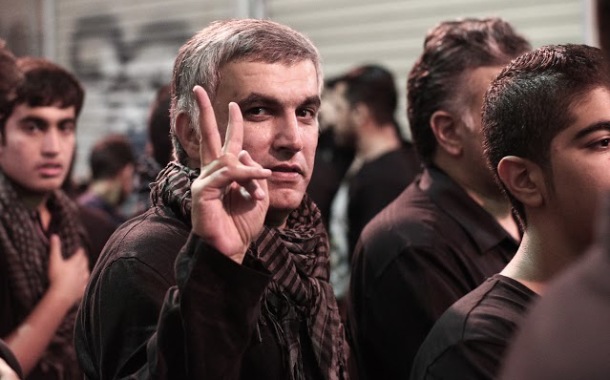17 May 2017 – Bahraini courts this week have again postponed two separate trials of prominent Bahraini human rights defender Nabeel Rajab. Both trials are based on charges that violate Rajab’s right to free expression. The Bahraini authorities have detained Rajab since June 2016 and are prosecuting him in connection with television interviews and tweets in which he criticized the government’s use of torture and its role in supporting the Saudi-led conflict in Yemen. He faces a total of up to 18 years in prison on these charges. Americans for Democracy & Human Rights in Bahrain (ADHRB) continues to condemn the ongoing arbitrary detention and judicial harassment of Nabeel Rajab, and calls for his immediate and unconditional release.
The first of Nabeel Rajab’s trials this week was set to take place yesterday, 16 May, and has been postponed until 30 May. Bahraini authorities in this case have charged Rajab with making “false or malicious” statements during television interviews in 2015 and 2016 in which he criticized the Bahraini government’s refusal to permit the entry of journalists and rights groups into the country. This charge carries up to three years in prison. Rajab’s second, separate trial was scheduled to continue today, 17 May, and has since been postponed until 14 June. In this case, Rajab faces charges of “spreading rumors in wartime,” “insulting a neighboring country,” and “insulting a statutory body,” all in relation to tweets and retweets in which he criticized the Saudi-led war in Yemen and documented torture in Bahrain’s Jau Prison. Rajab faces up to 15 years in prison on this second set of charges.
The Bahraini government’s treatment of Nabeel Rajab represents one of the most severe patterns of judicial harassment currently ongoing in the country. In particular, the government has now postponed Rajab’s trials a total of 20 times. As a result, Bahraini authorities have held him in pre-trial detention for approximately 11 months, nine of which he reportedly spent in solitary confinement contrary to international standards and Bahraini law. Moreover, Bahraini security forces have failed to provide Rajab with adequate medical treatment throughout the duration of his detention, despite his deteriorating health. Rajab has, for example, suffered from recurring heart palpitations requiring medical care and has developed new conditions, including a low white blood cell count and depression. In early April 2017, Rajab underwent surgery to treat bleeding ulcers. Despite medical advice to the contrary, Bahraini authorities took Rajab back into custody soon after and held him in unsanitary conditions. As a result, Rajab’s surgical wound became infected and has necessitated his re-hospitalization.
“The Government of Bahrain’s continued arbitrary detention and ill-treatment of Nabeel Rajab is utterly unacceptable. Bahraini authorities are so fearful of their citizens being able to exercise their right to free speech that they imprison peaceful critics for posts on social media,” said Husain Abdulla, Executive Director of ADHRB. “The international community, many members of which have called for Nabeel Rajab’s release, must redouble their efforts and demand that Bahraini authorities immediately drop the farcical charges against him and allow him to walk free.”
Numerous governments, members of national legislatures, and international organizations have recently called for Rajab’s release. In several instances, these calls have come in response to the same government abuses that Bahraini authorities have detained Rajab for discussing. Last week, for example, the United Nations (UN) Committee against Torture (CAT) released its concluding observations regarding Bahrain’s second and third periodic reports. In its remarks, the CAT condemned widespread allegations of torture in Bahrain’s prisons and detention centers and explicitly called on the government to release Nabeel Rajab and provide him with adequate medical care. Earlier that same week, Bahraini authorities prevented a German journalist and a Human Rights Watch representative from entering the country. Bahrain also underwent its third-cycle Universal Periodic Review in early May, which resulted in more than 215 recommendations regarding ways in which to improve human rights conditions in the country. Such recommendations included the release of Bahrain’s prisoners of conscience. On 3 May 2017, Gerry Adams, a member of Ireland’s parliament, raised the case of Rajab’s detention and deteriorating health in a question directed at Ireland’s Minister of Foreign Affairs. In late April, UK Members of Parliament Margaret Ferrier and Lord Scriven issued similar questions in the House of Commons and the House of Lords. In the US Congress, the Tom Lantos Human Rights Commission and Congressman Jim McGovern have raised Rajab’s case and advocated for his release. In the past, the US government itself has called on Bahrain to release Nabeel Rajab. However, new calls for his release have not yet been forthcoming from the Trump administration.
ADHRB continues to be appalled at the ongoing detention and judicial harassment of Nabeel Rajab and views it as arbitrary and unlawful in light of Bahrain’s obligations under international human rights law. ADHRB therefore calls on the Government of Bahrain to immediately and unconditionally release Nabeel Rajab from detention, drop all charges against him, and provide him with adequate medical care. We likewise reiterate our calls on the international community, and in particular Bahrain’s allies in the US, UK, and EU, to stand by their own commitments to human rights by urging Bahraini authorities both publicly and privately to release Nabeel Rajab and allow him to receive the international medical assistance he needs.





